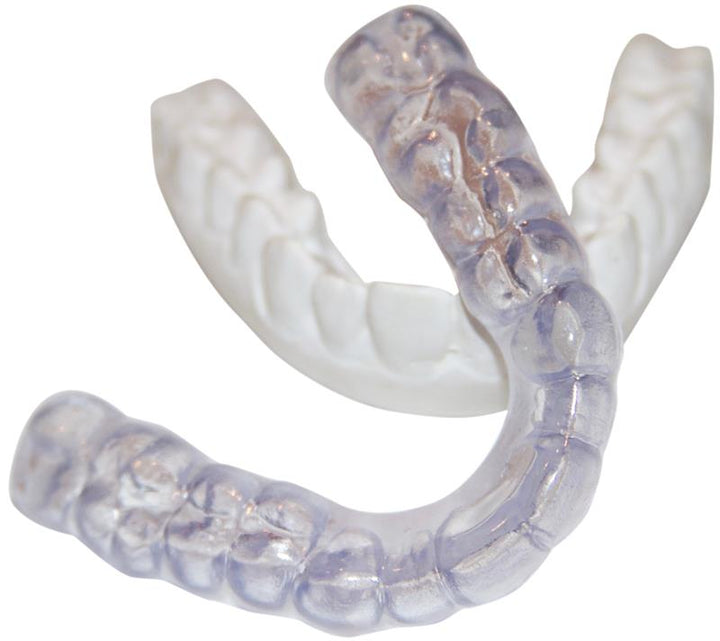So, you’re in bed and just beginning to drift off when you notice it: a light tapping, maybe a muffled scraping sound. It’s coming from beside you in the bed, from your partner’s mouth…
Thanks to scenarios like this, sharing a bed with someone can help teeth grinders find out about their damaging nocturnal habit. Without those neighboring ears, it might take far longer to realize there’s an issue. In fact, many people don’t realize that they grind their teeth until they chip a tooth in their sleep or their dentist notices wear or numerous craze lines in the teeth (craze lines are lines of discoloration—like faint cracks—that appear in teeth due to pressure and trauma).
It’s important to tell your partner if you notice any signs of bruxism (the scientific term for teeth grinding) at night. Indicative sounds can include actual grinding sounds as well as muffled clicking, popping, and tapping. Unfortunately, clenching does not produce as much sound as grinding does. But clenching can still damage your teeth and gums.
What if you don’t share a bed?
How do you catch teeth grinding in the early stages if you don’t have a partner there to hear it? There are a number of things to look for.
-
First of all, pay attention to your teeth and jaw whenever you wake up (in the morning or in the middle of the night). Does your jaw seem tight or clenched? Are your teeth sensitive? Are they touching? The best position for your teeth while sleeping is to be slightly parted with your tongue against the top of your mouth. So, if your jaw is fully closed and your teeth are touching, it can be a sign that you are grinding or clenching.
-
You can also look for signs of tension in your jaw, including tenderness, soreness, or stiffness in the jaw muscles and the muscles on the sides of the neck. In some cases, you may notice clicking sounds when opening or shutting your jaw, or you might experience pain when opening and closing your mouth or feel like you can’t open your mouth all the way.
-
Pay attention to your mouth and teeth during the day. A lot of people express tension through oral fixations or jaw movements. You may shift your bite around frequently, rubbing or tapping certain teeth together maybe in a particular rhythm. If you do this during the day to cope with stress, chances are high that you do it subconsciously at night as well—perhaps more aggressively.
-
Visit a dentist regularly. A dentist can notice signs of wear on your teeth that can indicate teeth grinding, and the dentist will help you address the issue so that it doesn’t lead to gum disease, chipped teeth, or tooth loss.
-
Take note of sleep interruptions and daytime fatigue. Teeth grinding often goes hand-in-hand with other sleep disorders. So, if you are experiencing interrupted sleep cycles and daytime sleepiness, you could be grinding your teeth.
What can you do about teeth grinding?
Addressing the root cause of teeth grinding can be tricky and time-consuming, and it’s rare that any one treatment is a hundred percent effective. So, it is always crucial to start protecting your teeth from damage right away. You’ll do this by wearing a night guard.
Night guards come in a variety of styles and densities to suit your particular needs. If you are new to wearing one, you may want to start with a thinner, more flexible design that provides excellent comfort. But if you grind aggressively, you can upgrade to denser material for a more durable guard that will last longer.
It is always best to buy a custom night guard. Though there are generic night guards available at many drug stores, they often fit poorly. A bad fit can actually aggravate your mouth and jaw, which can create other issues. So, a comfortable custom-made night guard is always the best choice.
Once you have your night guard, try to identify the issues that contribute to your teeth-grinding habit. If you have teeth or jaw alignment issues, these should be addressed as they can both cause physical stress that can lead to teeth grinding. Other causes of physical stress include sleep apnea and upper airway resistance syndrome (UARS), both of which interfere with sleep cycles.
Emotional stress is the other main cause of teeth grinding. You may, in fact, notice an uptick in your grinding habit during periods of high stress. To address this, identify stressful factors in your life and see whether there are any stresses you can minimize. Create a de-stress routine for the end of your day or for before bed. And include activities in your life that help your body relax and rejuvenate, such as fun social activities, exercise, time spent outdoors, and fulfilling hobbies. Read TeethNightGuard’s blog for more tips and ideas. And find an affordable custom night guard by ordering online with TeethNightGuard.
JOIN OUR NEWSLETTER! RECEIVE PROMOTIONS & COUPONS FOR CUSTOM DENTAL NIGHT GUARDS
INTERESTED IN BECOMING AN AFFILIATE OF TeethNightGuard.com?
Earn a 15% commission for simply sharing with your friends and family through email or social media such as Facebook, Reddit, or Twitter. Sign up and learn more here: https://www.teethnightguard.com/pages/register-affiliate-account
EXTRA DURABLE 3MM CUSTOM NIGHT GUARD - MAXIMUM DURABILITY AND COMFORT - MOST RECOMMENDED

$119.99
Item Number SWSPRO Manufacturer Sparkling White Smiles Dental Lab Rating Product Description Love this product? Share the product page link with Friends and Family. Simply copy the product page web address or this link: Custom Teeth Night Guard and post!… Read More